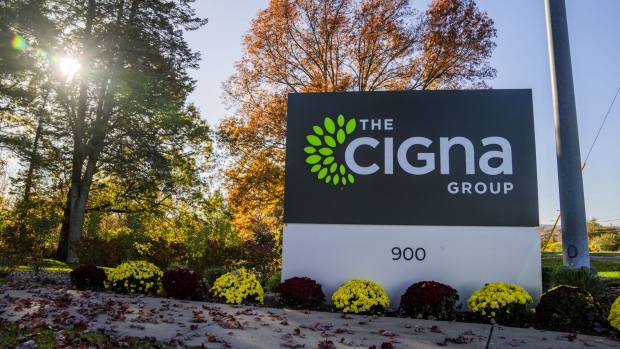Nov 29, 2023
Cigna, Humana Are Discussing Cash and Stock Merger, WSJ Says
, Bloomberg News

(Bloomberg) -- Cigna Group and Humana Inc. are in talks to combine, but both companies’ shares dropped on the prospects of joining two of the biggest US health insurers in an industry that’s already highly consolidated.
The pair are discussing a cash-and-stock deal but the timing and structure are unclear, according to people familiar with the matter. Deliberations are ongoing and there’s no certainty they’ll result in a deal, according to the people, who asked not to be identified discussing confidential information. Representatives for the two companies didn’t respond to requests for comment.
Cigna closed down 8.1% on Wednesday, its biggest one-day loss in more than two years, while Humana fell 5.5%. The bearish market response signals investors in both companies think a combination, and what it would take to close it, may be worth less than the sum of its parts.
There are strategic reasons for the companies to join up: Cigna owns Express Scripts, one of the largest managers of pharmacy benefits, a line of business where Humana is a less significant player. Humana is one of the biggest providers of private Medicare Advantage plans, while Cigna’s Medicare business is small by comparison. And Humana has said it is going to stop selling employer coverage, where Cigna is strongest.
But the US health insurance industry is already highly concentrated. Cigna’s market cap is just under $80 billion while Humana’s is almost $60 billion. Even if their combination looks far smaller than UnitedHealth Group Inc. — the market leader with a market value of almost half a trillion dollars — it would surely trigger antitrust scrutiny from the competition-conscious Biden administration.
‘Transformative Transaction’
An antitrust review would “create an 18-24 month overhang,” TD Cowen analyst Gary Taylor said in a research note. If completed, the combination would be “a transformative transaction,” he wrote.
Yet the chances of a successful deal are in doubt, said Bloomberg Intelligence analyst Glen Losev said.
“The odds of the deal closing are questionable given the size of the combination and increased federal scrutiny of PBMs and health insurers,” Losev said. The prospect of diluting value for Cigna investors is driving the stock down, he said.
Proposed tie-ups of Cigna and Anthem, now Elevance Health Inc., and a separate deal for Humana to combine with Aetna were both blocked by regulators in recent years. Industry mega-mergers among insurers have largely been on hold since then.
Insurers have branched out into other markets including direct care delivery and pharmacy services. Cigna bought Express Scripts, the second-largest pharmacy benefits manager, while Aetna was sold to pharmacy giant CVS Health Corp.
Widening Portfolios
As a handful of big companies accumulated widening portfolios of health-care operations, officials have raised alarms about the consequences for patients, employers and taxpayers who foot the bill. The Federal Trade Commission is probing pharmacy benefits managers, and the Department of Justice tried unsuccessfully to block UnitedHealth’s acquisition of data and payments company Change Healthcare.
Cigna has told investors that any large-scale tie-up must be aligned with its long-term strategy, financially attractive — and likely to be completed.
The company’s Chief Financial Officer Brian Evanko said at a conference this month that any proposed mergers must have “a high probability of closing,” a position that the company has long held. It’s unclear if Humana would meet that criteria, especially under a Biden administration that has heightened antitrust scrutiny.
The discussions of a deal were reported earlier by the Wall Street Journal, which cited people familiar with the matter.
--With assistance from Fiona Rutherford and Gerry Smith.
(Updates with additional information throughout.)
©2023 Bloomberg L.P.

